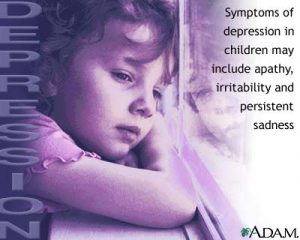Symptoms & Signs
Overall, depression can change or distort the way adolescents see themselves and their lives, as well as the people around them. Adolescents with depression usually see everything more negatively, and are unable to imagine that any problem or situation can be solved in a positive way.
Some or all of these symptoms of depression may be present:
* Agitation, restlessness, and irritability
* Appetite changes (usually a loss of appetite but sometimes an increase)
* Difficulty concentrating
* Difficulty making decisions
* Episodes of memory loss
* Fatigue
* Feelings of worthlessness, hopelessness, sadness, or self-hatred
* Loss of interest or pleasure in activities that were once fun
* Thinking or talking about suicide or death
* Trouble sleeping, excessive sleeping, or daytime sleepiness
Sometimes there may be changes in behavior or new problems at home or at school when there are no signs or symptoms of depression or sadness:
* Acting-out behaviors (missing curfews, unusual defiance)
* Criminal behavior (such as shoplifting)
* Faltering school performance, grades dropping
* Highly irresponsible behavior pattern
* Use of alcohol or other illegal substances
* Withdrawal from family and friends, spending more time alone
If these symptoms last for at least 2 weeks and cause significant distress or difficulty functioning, get treatment.
Diagnosis & Tests
True depression in teens is often difficult to diagnose, because normal adolescents have both up and down moods. These moods may alternate over a period of hours or days.
Sometimes when they are asked directly, children or adolescents will say that they aren’t happy or sad. Health care providers should always ask children or adolescents about symptoms of depression.
They will perform a physical examination and order blood tests to rule out medical causes for the symptoms. The doctor will also evaluate for signs of substance abuse. Heavy drinking, frequent marijuana (pot) smoking, and other drug use can be caused by, or occur because of depression.
A psychiatric evaluation will also be done to document the teen’s history of sadness, irritability, and loss of interest and pleasure in normal activities. The doctor will look for signs of other psychiatric disorders such as anxiety, mania, or schizophrenia. A careful assessement will help determine the risks of suicide or homicide — that is, whether the teen is a danger to him or herself or others.
Information from family members or school personnel can often help identify depression in teenagers.
Adolescent depression: Overview, Causes
Adolescent depression: Symptoms & Signs, Diagnosis & Tests
Adolescent depression: Treatment
Reviewed By : Fred K. Berger, MD, Addiction and Forensic Psychiatrist, Scripps Memorial Hospital, La Jolla, California. Also reviewed by David Zieve, MD, MHA, Medical Director, A.D.A.M., Inc.

